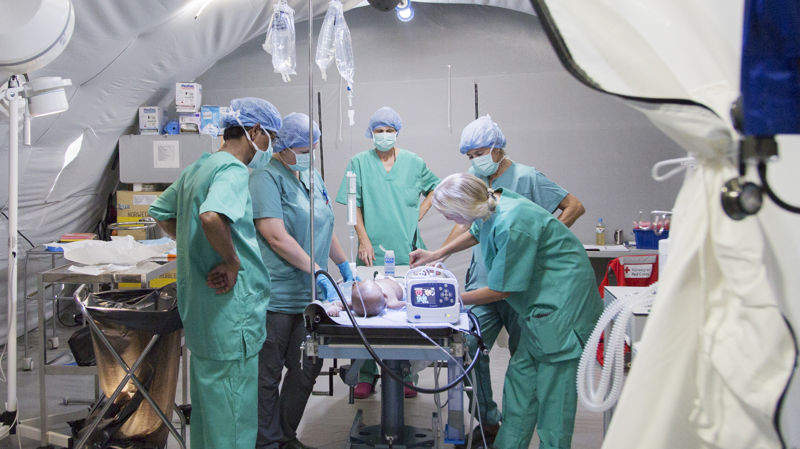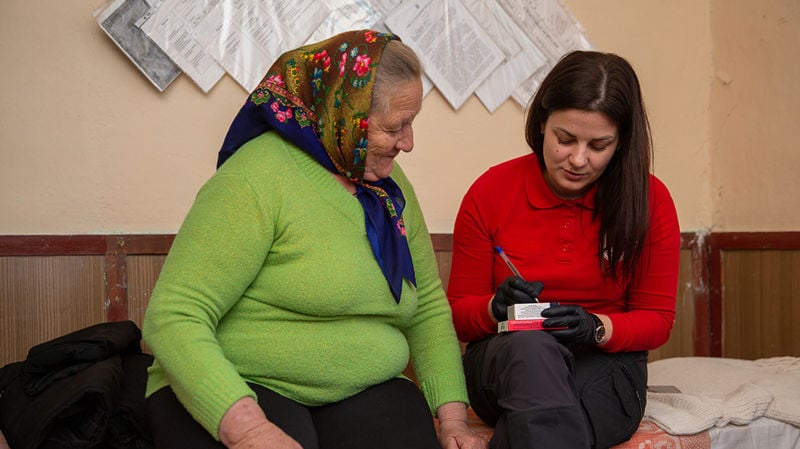Red Cross Emergency Hospital to be set up in Tampere for certification – expertise in emergency health is also important in Finland

The Finnish Red Cross is building its field hospital and clinic in Tampere this week for international certification. The Finnish Red Cross is one of the five Red Cross societies in the world with a field hospital. The hospital and clinics are always on standby to be deployed to crises around the world, but are also ready for use in Finland.
The Red Cross Emergency Hospital with surgical capacity will be built in Tampere Sports & Expo event centre. The hospital will be completed on Tuesday 25 November, and later in the week a clinic – an equivalent to a health station – and mobile clinic will be set up on the same site. The units will be assembled for certification and training.
The Finnish Red Cross is one of the five national Red Cross societies in the world that have their own emergency hospital for deployment to areas affected by disasters or conflicts. In recent years, the Finnish Red Cross has been involved in clinic and hospital operations in Ukraine, Gaza and Haiti, among other regions.
For decades, the Finnish Red Cross has played an active role in advancing the development of emergency health units internationally. This development work draws on insights gained from aid operations dating back to the 1970s.
Our expertise in emergency health can be used not only abroad but also in Finland.
“Our expertise in emergency health can be used not only abroad but also in Finland, as Finland develops healthcare’s preparedness for exceptional circumstances. In addition, our aid workers are constantly bringing home experiences from the field missions that is difficult to gain in Finland," says Johanna Arvo, Emergency Operations Coordinator at the Finnish Red Cross.
The field hospital will be set up in tents and will be of equal level to a regional hospital, with 24-hour wards for surgery, traumatology, internal medicine, infectious diseases and paediatrics. The hospital also offers gynaecology and maternity services, including a maternity ward.
Health clinics, equal to health stations, provide primary health care services, while mobile clinics bring doctors and nurses to those in need.
These medical units can be sent to an area where health services are unable to meet people's needs adequately, for example due to a natural disaster or conflict. An emergency hospital or a clinic will be sent to the affected areas by the request of the local Red Cross or Red Crescent society and in agreement with the national authorities.
International certification boosts aid work
The emergency response units of the Red Cross, including field hospitals and clinics, have served as a model for global standards developed by the World Health Organization (WHO). The Finnish Red Cross emergency hospital and clinics to be built in Tampere will also be certified according to the WHO minimum standards for Emergency Medical Teams.
Arvo, who has been in charge of emergency hospitals e.g. in Haiti, stresses that these common criteria, operating models and equipment make it easier to coordinate activities with the affected country's own health care system, for example.
“Consistency is vital in large-scale aid operations, in particular. When help is needed quickly, it is important that the party requesting it knows what kind of help is available. Ultimately, it is all about ensuring that every patient receives high-quality and timely care, even in the midst of a disaster,” says Arvo.
Competent and skilled personnel are a key part of an emergency hospital's readiness to help. The emergency hospital to be built in Tampere will therefore also be used to train aid workers. Red Cross clinical and technical aid workers will be trained in infection control, management of mass casualty incidents, and instrument sterilization in field conditions, among other things. In total, the Finnish Red Cross has a reserve of about 1,000 professionals from different fields who can be called upon to assist in emergency operations.

